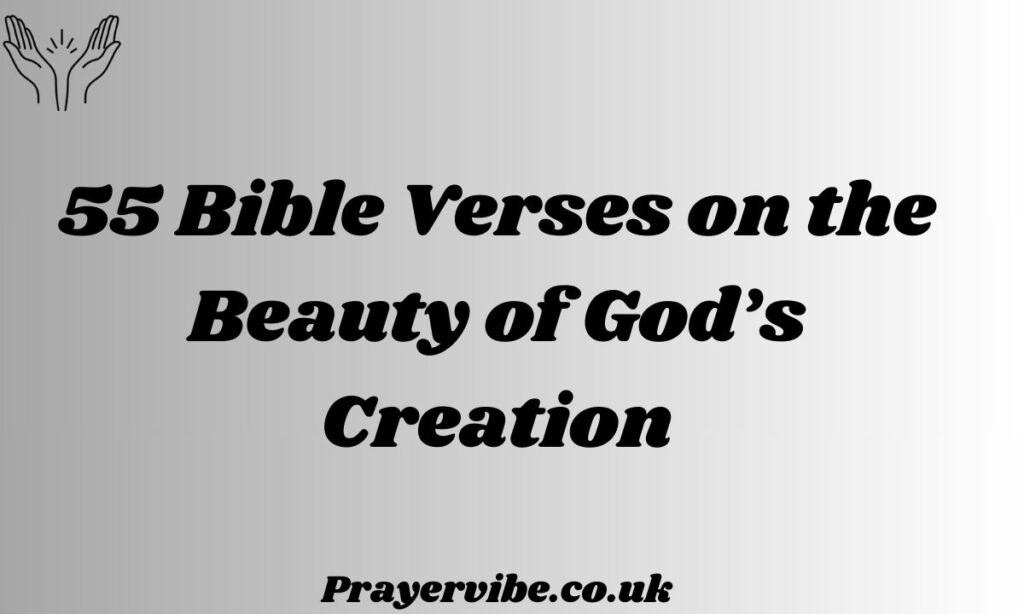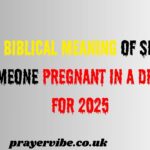The Bible contains many beautiful verses celebrating God’s creation, from Genesis where God creates the heavens and earth to Psalms praising the majesty of nature. These scriptures remind believers that the natural world reveals God’s character, with Romans 1:20 suggesting God’s attributes are seen through creation.
Many verses like Psalm 19:1 declare that “the heavens proclaim the glory of God,” highlighting nature as a divine testament. Jesus himself pointed to nature as evidence of God’s care, referencing birds and flowers in Matthew 6. These passages invite readers to appreciate creation’s beauty while recognizing it as a reflection of its Creator.
🙏 Divine Prayer Generator
Select a prayer category to begin
Genesis 1:1 – Foundation of Creation
God created the heavens and earth, establishing the foundation for all existence. This powerful declaration opens the Bible, setting the stage for understanding our world as divinely crafted rather than accidental. It reminds us that creation has purpose and intentional design behind it.
Psalms 19:1 – Nature Proclaims God’s Glory
The heavens declare God’s glory and the skies proclaim his handiwork. When we gaze at beautiful sunsets, starry skies, or majestic mountains, we witness nature’s testimony about its Creator. These natural wonders silently yet powerfully point to God’s majesty.
Psalm 104:24 – God’s Wisdom in Creation
The Lord created with wisdom, filling the earth with creatures that display incredible design. From microscopic cells to complex ecosystems, creation reveals thoughtful intelligence. This diversity shows not just power but remarkable ingenuity, suggesting a Creator who delights in creativity.
Ecclesiastes 3:11 – Beauty in God’s Timing
God makes everything beautiful in its proper time and has set eternity in human hearts. This reminds us that creation follows divine timing beyond our understanding. Though we long to comprehend God’s eternal plan, we experience life in moments that unfold according to his perfect schedule.
Isaiah 40:26 – God’s Power in the Heavens
God calls out the stars by name through his great power and mighty strength. The vastness of space, with countless galaxies and stars, demonstrates God’s incomprehensible power. Yet he knows each celestial body intimately, showing both his cosmic authority and personal attention.
Psalm 8:3-4 – Paradox of God’s Care
Despite creating the moon and stars, God still mindfully cares for humanity. This presents a beautiful paradox: the Creator of vast galaxies values and attends to human beings. Our significance comes not from our size in the universe but from God’s special attention and love.
Psalm 104:19 – God’s Design and Order
God appointed the moon for seasons and the sun knows when to set. This demonstrates the perfect order within creation, with celestial bodies following precise patterns. Such reliability reflects a Creator who values consistency, rhythm, and dependable cycles in the natural world.
Jeremiah 10:12 – God’s Power and Wisdom in Creation
God made the earth by his power, founded the world by his wisdom, and stretched out the heavens by his understanding. Creation required not just raw power but intelligence and purpose. This multifaceted act shows God’s comprehensive abilities as Creator, combining strength with thoughtful design.
Psalm 19:1-2 – Heavens Declare God’s Glory
Day after day and night after night, the heavens continue revealing knowledge about God. Creation’s testimony never stops but continues speaking to all generations across time. The constancy of this silent witness provides unchanging evidence of divine craftsmanship that transcends human lifespans.
Job 12:7-10 – Wisdom from Observing Nature
Animals, birds, earth, and fish can teach us profound lessons about God. When we observe nature carefully, we discover divine wisdom embedded in creation. The instincts of animals, migration patterns of birds, and complex ecosystems all point to a Designer.
This passage reminds us that creation itself serves as a classroom where we can learn about God’s ways. Even the most humble creatures demonstrate God’s thoughtful care and ingenious design, offering silent testimony to anyone willing to observe and listen.
Colossians 1:16 – Jesus Christ as Creator
Through Jesus, all things in heaven and earth were created, whether visible or invisible. This profound revelation shows Christ was not merely a prophet or teacher but the divine Creator himself. Everything that exists—thrones, powers, rulers, authorities—came into being through him and for him.
This transforms our understanding of Jesus from simply a historical figure to the eternal God who designed and fashioned the universe. His role as Creator establishes his authority over all creation.
Psalm 65:9-11 – God’s Care and Provision
God waters the earth, enriches it abundantly, and provides grain for people. His care extends to sending rain, preparing soil, blessing crops, and ensuring harvests. This passage portrays God as actively involved in sustaining creation, not distant or uninvolved.
The cycles of nature—rainfall, growth, and abundance—reflect his generous provision. God’s goodness overflows in creation, with his paths “dripping with abundance” like a cart overloaded with harvest blessings, showing his desire to nurture and satisfy his creatures.
Psalm 136:5-9 – God’s Enduring Love
God created the heavens, earth, sun, moon, and stars as expressions of his faithful love. Each act of creation demonstrates not just power but enduring devotion toward what he made. The psalm’s repeated refrain—”His love endures forever”—connects creation directly to God’s loving character.
These verses reveal that the universe exists because of love, not mere chance or cold purpose. The ordered cosmos, with light separating from darkness and celestial bodies marking seasons, reveals a Creator whose love remains constant.
Psalm 33:6-9 – Creative Power of God’s Word
God spoke the universe into existence, creating by the breath of his mouth. This shows the effortless power of divine speech—words that instantly transform nothing into something. The waters gathered and depths were stored simply because God commanded it.
This passage emphasizes creation’s obedience to its Maker, with all earth standing in awe of his word. The creative force behind galaxies, mountains, and oceans wasn’t laborious effort but simply powerful speech, revealing God’s supreme authority.
Psalm 147:8-9 – God’s Care for Creation
God covers the sky with clouds, provides rain for the earth, and makes grass grow on hills. He doesn’t just create but actively sustains creation through ongoing care. This passage highlights God’s attention to humble creatures like young ravens when they cry out.
Such details reveal a Creator intimately connected to creation rather than distant or uninvolved. God’s provision extends beyond human needs to wild animals and plants that seemingly offer nothing in return, demonstrating his generous character.
Nehemiah 9:6 – Exclusive Creator
God alone made the heavens, earth, seas, and everything within them, and he preserves it all. This declaration emphasizes God’s exclusive role as Creator, rejecting the idea of multiple deities responsible for different aspects of nature.
The verse acknowledges both God’s initial creative act and his ongoing maintenance of everything that exists. It culminates with the proper response—worship—as the heavenly hosts bow down before the one true Creator who brought all things into being.
Psalm 95:4-5 – God’s Sovereignty Over Creation
God holds the depths of the earth and mountain peaks in his hands. He owns the sea because he made it, and his hands formed the dry land. This psalm portrays creation not as independent from God but as something he actively holds and possesses.
The contrast between lowest depths and highest peaks emphasizes God’s authority over all extremes and everything between. His ownership isn’t arbitrary but based on his role as Maker, establishing his right to sovereignty over all creation.
Revelation 4:11 – Worship for the Creator
God deserves glory, honor, and power because he created all things for his pleasure. This heavenly worship scene reveals creation’s ultimate purpose—to fulfill God’s desire and bring him joy. The passage connects God’s worthiness of worship directly to his identity as Creator.
Unlike manufactured idols, God alone deserves adoration because everything exists by his will. This verse reveals that creation wasn’t random or purposeless but intentionally designed according to God’s desire, giving profound meaning to existence.
Psalm 145:9 – God’s Compassion for All
The Lord is good to everyone and has compassion for all he made. This verse reveals God’s character as fundamentally kind and compassionate toward his creation. His goodness extends beyond humans to animals, plants, and all created things.
This universal compassion shows that God values everything he made, not just humans or certain favored creatures. The passage challenges us to recognize divine care operating throughout creation, reminding us that God’s loving concern encompasses the entire world he fashioned.
Job 38:4 – God’s Supreme Authority
God challenges Job by asking where he was when the earth’s foundations were laid. This powerful question reminds humans of our limited perspective compared to God’s eternal knowledge.
None of us witnessed creation or participated in designing the universe. God alone established measurements, cornerstone, and boundaries for our world, demonstrating his unmatched authority.
Matthew 6:26 – God’s Loving Care Illustrated
Jesus points to birds that neither sow nor reap yet receive God’s provision. This simple observation offers profound comfort about God’s attentive care. If God feeds creatures who don’t plant crops or store food, how much more will he care for humans?
Revelation 21:1 – Then I saw a new heaven and a new earth
John describes a vision of complete renewal where present heaven and earth pass away. This reveals God’s ultimate plan to recreate, not abandon, his creation. The absence of sea symbolizes removal of chaos, separation, and danger.
This future restoration completes God’s creation story, bringing perfect healing to a broken world through divine transformation.
Romans 1:20 – Revelation through Creation
God’s invisible qualities, eternal power, and divine nature are clearly seen in what he made. Creation serves as a universal testimony that leaves humanity without excuse for ignoring God. Even without written scripture, people can discern basic truths about God through observing the natural world. Creation functions as God’s first revelation, making his existence evident through its design.
Job 37:14 – Marvel at God’s Works
Elihu urges Job to stop and consider God’s wondrous works. This invitation to careful observation reminds us to pause amid life’s chaos and contemplate divine creativity. When we attentively study natural phenomena like lightning, clouds, or animal behavior, we glimpse God’s wisdom.
Psalm 104:31 – The Enduring Glory of the Lord
The Lord rejoices in his works as his glory endures forever. This verse reveals God’s ongoing delight in what he created, not distant disinterest. Creation continues bringing joy to its Maker, showing his sustained connection with our world.
God’s glory remains evident throughout creation despite its fallen condition, testifying to divine artistry that transcends time and continues inspiring worship.
Conclusion
The Bible consistently portrays creation as a deliberate expression of God’s character and care rather than a random occurrence. From Genesis to Revelation, Scripture presents a cohesive narrative where creation begins with divine purpose, continues under God’s sustaining provision, and culminates in complete renewal.
These verses invite readers to see the natural world not merely as physical matter but as a testament to divine craftsmanship that deserves reverence and protection. By appreciating creation’s beauty and order, people can glimpse something of God’s nature and respond with appropriate wonder and worship.

Daniel Miller is a passionate writer, SEO expert, and blogger, specializing in Bible verses, prayers, and faith-based content at PrayerVibe.







